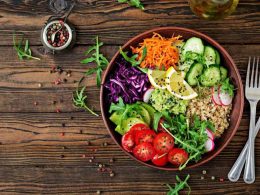Eggs are one of the healthiest foods we have on the planet and they are also the most controversial food. Whole eggs are very healthy, they are one of the best sources of inexpensive and excellent nutrients your body needs for survival.
There are two main components in whole eggs, they are egg white and egg yolk and some argue that the yolks are unhealthy because they contain a high level of cholesterol and increase your risk for heart disease.
Egg whites are purely protein while the yolk contains all manners of nutrients, including cholesterol and this is the reason why eggs were termed “bad” in the past and even till date some health expert still caution against eating plenty eggs.
What is Cholesterol?
Cholesterol is a waxy substance produced by the body and it can also be gotten from the food you eat. The body uses cholesterol for a lot of things, all your cells and tissues are made of cholesterol and your body uses cholesterol to repair broken and damaged blood vessels.
Your body wouldn’t function properly without cholesterol, it is involved in the production of hormones, it plays important roles in the digestion of food, and it functions as building blocks of the body.
Cholesterol is involved in the structural makeup of every cell in your body, it serves as a protective barrier and the functions of your cells are affected when the levels of cholesterol in your body diminishes.
This important molecule, cholesterol is involved in the production of vitamin D, the liver uses it to make bile, the substance which helps the body digest fats, and it is also employed in the production of steroid hormones such as testosterone, progesterone, and estrogen.
There are two main types of cholesterol in the body, the high density lipoprotein (HDL) cholesterol and the low density lipoprotein (LDL) cholesterol. Lipoproteins are molecules that carry cholesterol from your blood to the cells because it does not dissolve in the blood.
The HDL are the good cholesterol, they protect your heart and prevent heart diseases from occurring in the first place while the bad cholesterol, LDL raises your risk of having a heart disease.
Are Egg Yolks Safe?
Egg yolks actually have very high levels of cholesterol, they are the major source of cholesterol in our diet today, and 2 large wholes eggs contain approximately 422 mg of cholesterol.
Many think when they eat eggs or other sources of dietary cholesterol, it would increase the levels of cholesterol in their bloodstream, it doesn’t work that way.
Even if you don’t eat food high in cholesterol, your body (the liver) will still produce cholesterol in high amount because your body cannot do without this important substance, it is a mandatory nutrient for all your cells but when you eat more eggs and other sources of cholesterol, the rate at which your liver produces cholesterol will be reduced.
So, with this, your levels of cholesterol cannot be affected by what you eat. This happens because when you don’t eat cholesterol-rich foods, your liver will produce cholesterol in high amount but when you eat cholesterol-rich foods, the rate of cholesterol production will reduce.
This also means that whole eggs do not affect or increase your levels of cholesterol in any way. Besides, from the brief functions of cholesterol given above, you would have known by now that cholesterol is not a bad substance.
You cannot survive without cholesterol, humans can’t. Every single cell membrane in your body is made with cholesterol. Cholesterol is beneficial, what we should be worried about are trans-fat and saturated fats.
If you want to eat more of eggs and cholesterol-rich foods, then you should decrease your intake of refined sugar, refined carbs, and increase your intake of fiber, fruits, and vegetables.
Do Eggs Increase the Risks of Heart Disease and Other Chronic Diseases?
Recently, a lot of studies have been carried out to see how eggs cause heart disease and the results gotten were neutral and showed that it doesn’t increase your levels of cholesterol or increase your risk of heart disease.
Most of the results showed that it is safe to eat 2 whole eggs a day, apart from not causing heart disease, the results also showed that eggs improved the markers of heart disease in people with type II diabetes, this dramatically affected the shape and the size of the bad cholesterol (LDL) levels.
In another study, pre-diabetics who were placed on a carb-restricted diet were given whole eggs and at the end, they had better insulin sensitivity and greater improvement in markers of heart disease than the other patents who just ate only egg whites.
Another study had heart disease patients with type II diabetes given whole eggs and at the end of the experiment, they had better insulin sensitivity and improved greatly than their counterparts who only ate egg whites.
This study conducted an experiment with pre-diabetic people, they were given 3 whole eggs every day for twelve weeks, at the end of the study, and they had fewer inflammatory markers than the other group who were given egg substitutes.
These studies and many more have shown us that eggs do not in any way increase the levels of cholesterol or cause heart disease, in fact, egg yolk raises the levels of good cholesterol (HDL). Eggs also reduce the levels of triglycerides in your body.
Research has also proved that eating eggs on a daily basis is safe for people with heart disease, a study was conducted with 32 heart disease patients and they were given 2 whole eggs every day for 12 weeks and they had no negative side effects. I read a review of 17 studies which couldn’t find a link between heart disease, stroke, and other chronic disease and egg consumption.
In this study, 400,000 thousand Chinese adults were given whole eggs daily and they had an 18% decreased in death caused by cardiovascular diseases.
Why Where Eggs Linked to Heart Disease in the First place?
I can boldly say it was a misunderstanding because now the truth is coming out. One of the reasons eggs were labeled bad and dangerous is because of the role they thought it played in heart disease and hypertension.
Now, scientists know what actually happen. Remember I said cholesterol is used to repair broken and damaged arteries (blood vessels), when your blood vessels are damaged or broken, your body produces enough cholesterol or get them from the food you eat to patch or repair these damaged blood vessels.
When you keep doing the things that cause your blood vessels to get damaged (I will tell you what those things are later), the more cholesterol will be produced to repair them. This repair work can make the blood vessels narrow, thickened, or blocked completely, leading to hypertension, stroke, or heart attack.
So, now you see that it is not the fault of cholesterol but your fault, cholesterol was only doing its job. Now, the things that can scratch or damage your blood vessels are mostly all these chemicals and preservatives that we take in processed foods and water.
Chlorine added to water with the aim of killing harmful microorganisms is also one of the leading causes of damaged arteries, this is why some health experts warn against chlorine and fluoride in water.
This simply means that when your arteries are not damaged, there will be no patching by cholesterol which will block or narrow your arteries, it will be used for other important things in the body.
I read sometimes back of an ethnic group of people who had very high levels of cholesterol but low risks of all these chronic diseases because they were not into modern food and diet, so the cholesterol does not block their blood vessels.
Remember whether you eat eggs or not, your body still produces cholesterol, so even if you don’t eat eggs and you keep taking in chlorinated water and chemicals in preserved and processed foods, you will still be at risks of cardiovascular diseases.
Do people React Differently to Eggs?
Eggs are absolutely healthy and safe but some individuals might respond differently to eggs because they have different genetic traits.
Though there is not enough research on this, few studies have shown that individuals with the ApoE4 gene have an increased risk of cardiovascular diseases, diabetes, Alzheimer’s disease, and high levels of cholesterol even without eating cholesterol-rich foods.
Some health professionals advice people with this gene to avoid eggs and other cholesterol-rich foods, however, a study was conducted on 1,000 men with this gene and they found no link or association between high intake of eggs or cholesterol-rich food and heart disease in carriers of the ApoE4 gene.
This study revealed that when those with ApoE4 gene took plenty eggs or cholesterol-rich foods, their bodies reduced the rate at which it produced cholesterol just to compensate the high intake of cholesterol.
Another genetic condition that can affect how one responds to eggs is familial hypercholesterolemia, this genetic condition is characterized by very high levels of cholesterol and an accelerated risk of heart disease.
Those with this condition are usually advised to avoid eggs but from what I read years back, I know if your blood vessels are not damaged, there wouldn’t be a single problem.
Another set of people that respond differently to eggs are “dietary cholesterol hyper-responders”, their bodies produce more cholesterol when they eat high amounts of cholesterol instead of the body reducing its production of cholesterol.
This simply means that the levels of cholesterol in their bodies increase when they eat cholesterol-rich foods. Both good and bad cholesterol increases in these people when they eat these food, people with this condition have to be careful with their lifestyle and diet.
Hyper-responders are able to absorb and utilize most of the antioxidants present in the yellow pigment of egg yolk than others, this is highly important for the optimum function of their eyes and heart. They need constant check-up to know if this high level of cholesterol is not causing damages in their bodies.
This is just to let you know that some people with certain genetic conditions and traits can react differently after eating eggs by having a high level of cholesterol, their risks of chronic diseases can be reduced if their blood vessels are not damaged.
How Beneficial are Eggs?
Eggs are beneficial and highly nutritious, they contain everything that is needed to make a whole chicken, they contain tons of nutrients and they are one of the best sources of high-quality protein.
One whole egg contains a bit of everything the human body needs, it contains 72 calories, 23% of your RDI for selenium, 6 grams of proteins, 5% of your RDI for iron, 5% of your RDI for vitamin A, 6% of your RDI for folate (very important for pregnant women), 14% of your RDI for riboflavin, and 11% of the RDI for vitamin B12.
Eggs are super healthy and they are one of the most nutritious and healthiest foods you can eat. Even though they increase the levels of cholesterol, it is that of the good cholesterol (HDL) and slightly of the LDL if at all it does and it also modify the shape and size of bad cholesterol thereby reducing the risks of cardiovascular diseases.
However, if you have any of those genetic conditions mentioned above, you have to be careful with your intake of eggs and also live a healthy lifestyle, eat more of natural foods and drink clean and filtered water, free of chemicals and other toxins. So, briefly, before I stop writing, I want to show you some amazing health benefits of whole eggs.
23 Amazing Health Benefits of Whole Eggs
1. Prevents Cardiovascular Diseases
Eggs are rich sources of good cholesterol, HDL cholesterol which protect your heart and blood vessels. They are also rich in dietary selenium, this is a powerful anti-inflammatory mineral which help fight inflammation.
Selenium also prevents cardiac arrest because a deficiency in selenium has been linked to cardiac arrest, selenium supplements together with CoQ10 supplements reduce the risks of cardiovascular-related deaths in older people.
2. Rich Source of Choline
Choline is an important macronutrient needed for nerve function, metabolism, control of the muscles, and neurological development. Eggs are one of the richest sources of this essential nutrient.
This nutrient is also used in developing cell membranes and in producing molecules that help to signal the brain. Choline deficiency is fatal though rare.
A medium-sized egg contains approximately 100 mg of choline, pregnant women need more of this nutrient because it is required for the growth and development of the fetus.
Women need 425-500 mg of choline daily while men need 550 mg daily, pregnant women need more and one egg a day can fulfill this requirement. Choline is needed for the neurological development of a fetus even down to old age. Choline improves your memory and makes it crystal clear.
Rich Source of Essential Amino Acids
Eggs contains all the essential nine amino acids your body needs and that is why they are called “complete” or “perfect” protein.
There are 23 amino acids needed by your body, nine of these amino acids can’t be produced by the body and they must be gotten through the food you eat. These amino acids present are present in eggs and they are easily digested and absorbed.
Reduce Breast Cancer Risks
Eggs contain anti-cancer nutrients and they can help to reduce your risk of this disease when taken regularly. Choline, a powerful nutrient present in egg yolk helps to reduce your overall risks of cancer and there are studies which have shown that women who consume fewer eggs or no eggs at all are risks of breast cancer than women who do.
Boost Physical Performance
Eggs have rich amount of quality proteins that help to produce and maintain muscles, this increases your strength, endurance, and resiliency. High quality protein increases physical performance and activities and eggs are perfect proteins for your body.
Source of Essential Minerals
Eggs are packed with minerals your body needs for optimum health, these include phosphorous, zinc, and iron. Women benefit from iron, it prevents shortage of blood which can be caused by heavy menstruation.
Iron also relieves the symptoms of menstruation such as tiredness, moodiness, and others. Zinc fortifies your immune system and helps the body convert food into energy. Phosphorous gives healthy bones and teeth.
There is also a trace amount of iodine and selenium in eggs, iodine is needed for the production of thyroid hormones while selenium is a powerful antioxidant that slows down aging and reduces your risks of cancer.
Prevent Fatigue
Eggs prevent fatigue and fight tiredness by giving you long-lasting energy. This is because they have a rich content of B vitamins which help in increasing one’s levels of energy.
B vitamins help in converting the foods you eat into energy, whole eggs are rich sources of these vitamins. Vitamins B2 and B3 are found abundantly in egg whites while vitamins B5, B6, and B12 are concentrated in the yolks.
Aid Weight Loss
Eggs give you energy and leave you feeling full for a long time, a medium-sized egg contains about 75 calories, it is best to have eggs for breakfast because they keep you more satisfied and increase the levels of your energy throughout the day. This can also aid weight loss by helping to regulate your food intake and by controlling hunger.
Improves Your Vision
Eggs improve your vision and guards against age-related eye problems like macular degeneration, an almost unavoidable eye problem because it is part of aging but with quality nutrition like quality eggs, it will be reduced, prevented, or brought to a halt.
Two powerful nutrients needed to prevent this condition from happening are present abundantly in egg yolks and they are zeaxanthine and lutein. Eggs also reduce the risks of cataract by 20%. You need to eat 2 eggs daily to keep your vision healthy and safe.
Rich Source of Good Cholesterol
If you started reading from the beginning, you would have seen the important functions of cholesterol in the body and how good this substance is. Eggs are highly rich in HDL cholesterol and extremely low in bad cholesterol, LDL.
We know that that it is old news that eggs have bad cholesterol or that they cause cardiovascular diseases, daily intake of eggs do not increase the levels of bad cholesterol rather it raises the levels of good cholesterol which reduces your risks of cardiovascular diseases.
Increase Bone Strength
Eggs are one of the few dietary sources of vitamin D, an essential nutrient which the body can’t synthesize and must be gotten from food and sunlight.
Vitamin D increases bone strength and improves bone health by helping the body absorb calcium and other important minerals from foods, it prevents osteoporosis and other bone problems.
Improve Brain Health
Choline is found abundantly in eggs and it helps to facilitate the development of healthy brains in fetus and new born babies. It also protects the brain and improves your memory functions till old age.
One large egg gives a pregnant woman 28% of her daily requirement for choline. This nutrient is extremely important during pregnancy and lactation because the stores of choline in the body are depleted during these times.
This is also the same time when the brain and lifelong memory of the fetus is developed.
Reduce the Levels of Triglycerides
Pasture-raised eggs have high levels of omega-3 fatty acids than hens raised in the factory and fed man-made and GMO foods. These omega-3 acids help to reduce the levels of triglycerides in the body. Triglycerides raise the risks of chronic diseases.
Great Antioxidant Activity
Eggs are rich in many antioxidants, some of them are zeaxanthine, lutein, and vitamin A. Vitamin A function as an antioxidant in many parts of your body, it also works with zeaxanthine and lutein to protect your eyes and ensure healthy vision.
These antioxidants also destroy free radicals in the body, these are by-products of metabolism that cause oxidative stress, cancer, DNA mutations, and other genetic and chronic diseases.
Improve Skin Health
The antioxidants present in eggs, lutein and zeaxanthine protect your skin by filtering harmful blue rays that can cause damage to your skin and body.
Eggs also contain carotenoids, they slow down oxidative damage and protect the skin from harmful UV light that can wreak havoc on your skin.
There are eight nutrients that repel skin cancer and eggs have 5 of them, regular consumption of eggs will protect your skin and reduce your risks of skin cancer.
They Make Bad Cholesterol Less Harmful
LDL is the bad cholesterol and it increases your risks of chronic diseases like stroke, heart attack, and high blood pressure. Eggs help to convert these small cholesterol particles into large ones thereby reducing the rate at which they can cause harm to your body.
Eggs also help reduce the risks of chronic disease like heart disease and stroke because recent studies have not shown that eggs play a role in increasing the risks of these diseases.
Improve Liver Function and Health
Your liver needs choline to function effectively and by now you know that choline is present abundantly in eggs. This helps to boost and improve the function and health of your liver. Lower levels of choline in the body have been linked to fatty liver disease and some type of cancers also.
Boost Healthy Growth and Development
Eggs help little children grow and develop well, even adults can benefit from these. It helps the body grow and develop at the normal rate without any problems. Proteins are used in creating new body cells, repairing worn out cells and tissues and improve bone health also.
Give Healthy Hair and Nails
Many biochemical diseases and problems in the body show signs majorly on the nails and hair, eggs help prevent this and improve the health of your nails and hair because they are rich in sulphur, an important mineral that supports healthy metabolism.
Apart from sulphur, eggs also contain essential amino acids, the building blocks of proteins which make up your hair and nails, they also contain essential vitamins and minerals which boost healthy hair and nails. People who include eggs in their diet regularly have reported fast growing nails and hair.
Prevents Anemia
Eggs are rich in iron, an important mineral needed for the production of blood. A deficiency in iron leads to anemia and other symptoms like irritability, headaches, and tiredness.
Iron also helps in carrying oxygen to all cells of your body through the blood, it boosts your immune system, it is involved in energy metabolism and other important roles it plays in your body.
Egg yolk is rich in iron in the form of heme iron, this is the most absorbable form of iron, and it is even more absorbable than other forms of iron in foods and supplements.
An egg a day can help to prevent anemia and meet your requirements for iron thereby preventing iron deficiency and the consequences it brings along.
Boost Your Immune System
Eggs are powerful immune boosters, one large egg gives you 22% of your RDA for the important mineral selenium. Selenium fortifies your immune system and regulates the functions of your thyroid hormones.
When you give children and teens eggs regularly, you reduce their risks of having Kashin-Beck disease and Keshan disease, these conditions affect the bone, joints, and heart. People who are deficient in this important mineral selenium can improve by adding eggs regularly to their diet.
Reduce Stress and Anxiety
Eggs contain the 9 essential amino acids that the body needs, and these nutrients play a great role in our mental health and functions. When you are lacking in any of these, it will lead to unpleasant mental effects like depression, mood swings, stress, and anxiety.
Lysine, one of the essential amino acid help to increase the levels of serotonin in your body, this neurotransmitter is responsible for happiness and motivation.
Improve Your Quality of Life
Yes, you heard that right, eggs improve the quality of your life and also help to increase your lifespan because it is one of the most nutrient-dense foods on the planet.
Your body needs 20 amino acids for optimum function, it can make 11 except 9 and the remaining nine are found in eggs. When you are deficient in any of these 9, it will affect your health and appearance. You will notice weak immune responses, tiredness, unhealthy appearance of your nails and hair, and moodiness.
Is It Safe To Consume Raw Eggs?
Research shows that the proteins in eggs are readily available when cooked than when taken raw. This also means that there are more proteins in cooked eggs than in raw eggs.
Also, you increase your risks of salmonella poisoning when you take in raw eggs, it also leads to a deficiency in biotin, a very important vitamin needed by your skin, nails, and hair.
Eggs contain a protein Avidin, this protein binds to biotin and reduces its effect but cooking destroys it and besides, you have to consume a lot of raw egg white before you can develop a biotin deficiency but it is possible to get biotin deficiency from raw eggs. So, it is safer to consume cooked eggs than raw eggs.
Conclusion
So far, studies have revealed that it is totally safe to eat at most three whole eggs per day, because of all the studies I read on, none has fed people more than three whole eggs per day.
I don’t know or I can’t say whether eating more than that can affect your health negatively. Though there is just one report of case study involving an old lady of 88 years old who was given 25 eggs every day, she was in a very good condition and had absolutely normal levels of cholesterol.
Egg consumption just depends on how individuals respond to it, and whether you take eggs or not, your body will still make cholesterol.
Finally, all eggs are not the same, some are more superior than others, the best and healthiest eggs are gotten from pasture-raised hens.
Those grain-fed chickens raised in the factory produce low quality eggs, their eggs are very low in omega-3 fatty acids while pasture-raised hens produce eggs very rich in this vital nutrient and fat-soluble vitamins also. Go for quality eggs.
Sources;
- http://jn.nutrition.org/content/136/10/2519.full
- https://www.ncbi.nlm.nih.gov/pubmed/433821
- https://www.ncbi.nlm.nih.gov/pmc/articles/PMC2904713/
- https://www.ncbi.nlm.nih.gov/pmc/articles/PMC4113762/
- https://www.ncbi.nlm.nih.gov/pubmed/23021013
- https://www.ncbi.nlm.nih.gov/pubmed/19369056
- https://www.ncbi.nlm.nih.gov/pubmed/8120521
- https://www.ncbi.nlm.nih.gov/pubmed/23128450
- https://www.ncbi.nlm.nih.gov/pubmed/17134951
- https://www.ncbi.nlm.nih.gov/pubmed/7906572








